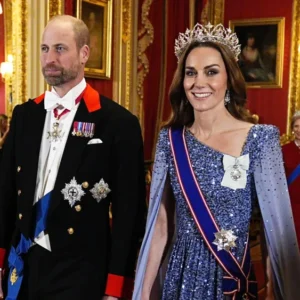In the high-octane arena of Netflix’s political thrillers, few series have mastered the art of leaving audiences breathless like The Diplomat. The show’s third season, which dropped all eight episodes on October 16, 2025, catapulted viewers into a maelstrom of power plays, fractured alliances, and marital implosions that make the corridors of Whitehall and the White House feel like a powder keg. But it’s the finale—”Schrödinger’s Wife”—that has ignited a firestorm of debate, with its subtle yet seismic revelation: Kate Wyler (Keri Russell) realizing her husband, newly minted Vice President Hal Wyler (Rufus Sewell), has orchestrated a betrayal of unthinkable proportions alongside President Grace Penn (Allison Janney). As the credits rolled, social media erupted—hashtags like #HalBetrayedKate and #PoseidonHeist trended globally, with fans gasping over a twist that doesn’t explode with gunfire but detonates in quiet, devastating silence.
Now, just days after the season’s premiere, the creators have broken their silence in a series of candid interviews, peeling back the layers on this gut-wrenching cliffhanger. Showrunner and creator Debora Cahn, speaking to outlets like Netflix’s Tudum and Collider, described Season 3 as “the split”—a deliberate fracture not just in Kate and Hal’s marriage but in the fragile U.S.-U.K. special relationship. “It’s the time when everything we’ve built starts to crumble,” Cahn revealed. “Kate lives the nightmare of getting what she wants, only to watch it slip away because of the people closest to her.” For a show that’s always thrived on the tension between personal intimacy and geopolitical chess, this ending isn’t just a plot device; it’s a profound gut punch to the series’ soul.
To grasp the full weight of this finale, it’s worth tracing The Diplomat‘s improbable ascent from a 2022 Netflix order to a bona fide phenomenon. Conceived by Cahn, a veteran writer from The West Wing and Homeland, the series draws from her insider knowledge of D.C. dysfunction and Foggy Bottom maneuvering. What began as a fish-out-of-water tale—Kate, a Middle East specialist yanked to London amid a British warship attack—quickly evolved into a razor-sharp dissection of ambition’s corrosive edge. Season 1, premiering April 20, 2023, hooked 173 million viewing hours in its first month, blending Veep‘s biting wit with House of Cards‘ shadowy intrigue. Critics hailed it as “the political drama we needed post-Trump,” with Russell’s portrayal of Kate—a rumpled, brilliant diplomat out of her depth—earning a Golden Globe and Emmy nods.
The ensemble clicked from the start. Rufus Sewell as Hal, Kate’s charismatic but scheming husband and fellow diplomat, brought a roguish charm that masked deeper manipulations. David Gyasi’s Austin Dennison, the suave British Foreign Secretary with whom Kate shares charged chemistry, added layers of transatlantic flirtation. Ali Ahn’s Eidra Park, the steely CIA station chief, provided unflinching loyalty, while Ato Essandoh’s Stuart Heyford, the embassy’s deputy chief, grounded the chaos with dry humor. Rory Kinnear’s Nicol Trowbridge, the blustery British PM, stole scenes as a Trumpian wildcard, and cameos from the likes of Michael McKean as President Rayburn injected star power. Season 2, arriving October 2024, amped the stakes with Allison Janney’s introduction as Vice President Grace Penn—a “terribly flawed woman” whose ruthless pragmatism made her both villain and anti-hero. It ended with Rayburn’s sudden heart attack, elevating Penn to the Oval Office and leaving Kate accusing her of the Season 1 false-flag attack on HMS Courageous.
Season 3 picks up in the ashes of that bombshell, thrusting Kate into a world upended by Penn’s ascension. The opener flashes back to the Wylers’ early days: a twist-tie ring fashioned from a bread bag closure, symbolizing their impulsive, all-in marriage forged in embassy bars and crisis negotiations. Cut to the present—Hal, vetted for VP but overlooked for Kate despite her qualifications, maneuvers relentlessly to carve out a real role for her beyond “Second Lady.” Kate, seething at being sidelined, shreds classified files and contemplates resignation, only to be pulled back by a nuclear nightmare: Russia’s submarine, carrying the Poseidon torpedo—a doomsday weapon capable of tsunami-level devastation—stranded off England’s coast.
The season unfolds as a pressure cooker of betrayals large and small. Penn, now commander-in-chief, eyes the Poseidon not as a threat but an opportunity, her “ends justify the means” ethos clashing with Trowbridge’s paranoia-fueled isolationism. He threatens to loop in China, forcing Kate into frantic shuttle diplomacy. Hal, sworn in as VP, whispers strategies in Penn’s ear, their late-night powwows sparking jealousy in both spouses. “There’s a spark there that’s devastating to witness,” Cahn noted of Hal and Penn’s dynamic, echoing the intellectual thrill of power couples gone rogue. Todd Penn (Bradley Whitford, reuniting with Janney in a West Wing nod), Grace’s affable but sidelined husband, confides in Kate about the loneliness of being “First Gentleman,” adding poignant irony.
Subplots simmer with their own twists. Eidra uncovers Margaret Roylin’s (Celia Imrie) role in the Courageous plot, leading to the whistleblower’s suicide in Episode 1—a gut-wrenching beat that underscores the human cost of leaks. Stuart and Eidra’s budding romance, teased in stolen glances over intel briefings, culminates in a tender finale moment, offering rare respite. Kate’s fling with British spy Callum Ellis (Aidan Turner, Poldark alum) reignites old flames, his rogue charm a counterpoint to Hal’s calculated intensity. A mid-season time jump propels the narrative from Rayburn’s funeral to a full-blown crisis, where Penn deploys an Ohio-class drone under the guise of reconnaissance—only for Kate to broker a deal with Trowbridge to bury any evidence of Russian involvement, preserving the alliance.
But the real venom lurks in the personal. Kate, propositioning Dennison in a wine-fueled haze, grapples with her isolation, while Hal’s vetting reveals his own murky past—hints of covered-up ops that Kate suspects were to shield her indiscretions. Their reconciliation in Episode 7 feels earned: Kate, realizing no one matches Hal’s partnership in chaos, asks him to take her back. He agrees, sealing it with a vow to fight for her influence. It’s a fragile triumph, laced with flashbacks to their twist-tie origins, reminding us why these two are endgame—until they’re not.
The finale unravels it all in a masterclass of escalating dread. At a glitzy D.C. gala, Kate fields congratulations as Second Lady, her smile masking fury. Privately, Callum pulls her aside: Russian divers have boarded the sub—Poseidon is missing. Todd, nursing a scotch, probes Kate about Hal and Grace’s “bond,” admitting Penn confided their alliance is pure strategy, no intimacy. The pieces snap into place for Kate: The drone wasn’t for photos. It retrieved the Poseidon, stashing it in U.S. hands while forcing Britain to cover the tracks. Hal and Penn didn’t just sideline her—they weaponized her diplomacy to sell the lie, risking war if exposed. Russia accuses Britain; China smells blood; Trowbridge’s trust evaporates. And Kate? She’s the unwitting pawn in her husband’s ascent.
In that final shot—Kate’s face crumpling as Hal approaches, oblivious—Russell delivers a silent scream of realization. “It’s a crazy line to cross,” Russell told Collider. “She’s not just betrayed romantically; it’s existential. Who is this man I rebuilt my life with?” Sewell, in a TV Insider chat, defended Hal’s opacity: “They’re both deadly in the same way—ambition blinds them. But this? It’s the fracture that could end them.” Janney, embodying Penn’s steely resolve, laughed off the moral quagmire: “Grace sees it as chess, not checkers. The world’s too messy for clean hands.” Whitford, channeling Todd’s wry outsider vibe, added levity: “I’m just trying not to trip over the nuclear football in these heels.”
Cahn, in her Tudum deep-dive, unpacked the deliberate restraint: “We toyed with explosions, but silence hits harder. This isn’t about the bomb—it’s about the trust bomb.” The Poseidon heist, she clarified, stems from Penn’s Season 2 machinations: a preemptive grab to deter Russian aggression, but one that poisons alliances. “Kate’s diplomat first, wife second,” Cahn emphasized. “Season 4 picks up in the fallout—global tensions boiling, her marriage in ruins. There’s plenty to worry about.” Filming kicks off soon in London and D.C., with Janney and Whitford promoted to regulars, promising deeper Penn family dysfunction.
Reception has been electric. IGN praised the season’s “propulsive blend of West Wing idealism and Succession savagery,” rating it 9/10 for elevating stakes without losing wit. Rotten Tomatoes sits at 94%, with critics lauding Russell’s “nuanced unraveling” and the writers’ balance of thriller pulse and character depth. Viewership? Over 150 million hours in week one, per Netflix, outpacing Squid Game Season 2 in key demos. Fans, though, are reeling: “That ending? Bone-chilling betrayal,” tweeted one, while another speculated, “Kate pregnant with Callum’s kid? Season 4 chaos incoming.”
The Diplomat has always been more than scheming suits—it’s a mirror to our era’s fraying bonds, where love and loyalty bend under power’s weight. Season 3’s cliffhanger doesn’t just tease apocalypse; it interrogates the cost of complicity. As Kate stares down Hal, the question lingers: Can she expose him without igniting war? Or will she play along, twist-tie ring be damned? With Season 4 locked, one thing’s clear: In Cahn’s world, diplomacy is war by other means, and no one’s safe.





